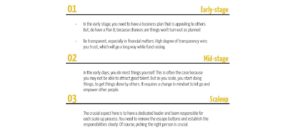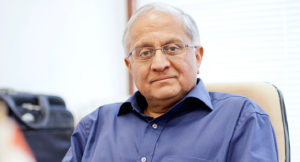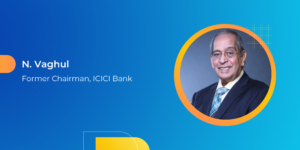Lessons on Leadership Series: How Harsh Mariwala transformed Marico from a small family-run enterprise in 1988 into a FMCG major with a market capitalization of 694.11 billion INR today.
The corridor leading up to Harsh Mariwala’s office on the 8th floor of Marico’s headquarters, overlooking the Mumbai International airport, is adorned with inspirational quotes sculpted on the walls. There is a quote from Shankaracharya – “vision is the art of seeing what is invisible to others”– that caught my eye. Another one from Graham Bell read, “When one door closes, another opens. But often, we look so long at the closed door, we don’t see the open one.”
As I reach Mariwala’s office, a contemporary, minimalistic space with glass walls separating a wonderfully manicured lawn, I notice a collection of management books. At the time of walking into his office, Mariwala was No. 35 on the Forbes India Rich List, with a net worth of over US $2.59 billion. But if I were to go by his office’s design, it was pretty clear that his passion for knowledge and learning is his real wealth.
I settle down to begin my interview. We chat about his books, several of which, I notice, were authored by Management Guru and Advisor, Ram Charan. Mariwala admits that they are very close and many of his books including Execution and Global Tilt are some of his favorites. Without wasting much time, we got into our conversation on the journey of Marico and his learnings along the way.
Key milestones
The first aspect I want to understand from Mariwala is his approach to managing transformations and what were some of the major change programs he had initiated. Mariwala says, “The biggest transformation was the formation of Marico itself. From a family-run enterprise, Bombay Oil, we transformed into a branded FMCG business that was professionally managed.”
Just to give you a background, Marico had its roots in a company called Bombay Oil, a firm that had various businesses including manufacturing of hair oil and edible oil, trading of spice extracts, hybrid seeds and a business division focused on specialty chemicals. In 1988, Mariwala led the formation of Marico, with the goal of transforming the hair oil and edible oil business. The flagship brands were coconut-based hair oil brand, Parachute and cooking oil, Saffola.
“The important thing then was to attract the right talent from different backgrounds into Marico and set the culture in place to build a large FMCG business,” explains Mariwala.
The responsibility given to a leader must be clear and for new projects to succeed, it is important to have someone dedicated to only that effort
![]()
The next big step was taking the company public in 1996. Mariwala recalls, “It required a whole new set of processes – managing investor relations, governance, image building, quarter-on-quarter goals and reporting.”
In 1998, Marico setup of new profit centers for international expansion and launched Kaya Skin Clinic in 2002. In March 2014, Mariwala took the major decision of stepping aside from day-to-day responsibilities and handed over the additional responsibilities of Managing Director to Saugata Gupta, then the CEO of Marico’s India business. These days, Mariwala is focused on enhancing the effectiveness of the board, long-term planning, CSR activities, Marico Innovation Foundation and handling select investor relations.
Note: While this interview was conducted in 2016, we included this conversation in the “Leadership Next” series since the takeaways are timeless and still relevant.
In quarter ending December 2015, Marico reported sales of Rs. 1,554 crore with a net profit of Rs. 200.54 crore. From a shareholder perspective, Marico has returned over 275 percent over a five-year period, a healthy number in the FMCG sector. In the same five-year period, Colgate-Palmolive India returned 117 percent and Gillette India returned 166 percent. Godrej Consumer and Emami returned 260 percent and 289 percent, respectively.
Marico’s global experience
As of FY 2015, more than a quarter of Marico’s revenues of Rs. 5,700 crore came from its global markets. It has sizable presence in Egypt, Bangladesh, Malaysia, Middle East, South Africa and Vietnam. Their expansion into the global market was through a combination of organic and inorganic methods. However, Mariwala admits that the company’s initial foray to go global was half-hearted. The international business was part of the domestic business and managers didn’t pay enough attention to the global business, since its topline contribution was small. And the only way his team tackled the problem was by setting up a dedicated leader in foreign locations. “This is what I call the removal of the escape button. The responsibility given to a leader must be clear and for new projects to succeed, it is important to have someone dedicated to only that effort,” he adds.
Today, Marico is one of the largest Indian companies listed in the Dhaka Stock Exchange. In addition to Saffola and Parachute, several Marico brands including Set Wet, Nihar Naturals, Livon and HairCode are doing well in the country. In fact, HairCode is the number one hair dye in Bangladesh.
Mariwala used acquisitions as a key tool to fuel his global ambitions. In January 2010, Marico acquired Malaysian brand, Code10, to enter the hair styling market. The company bought a stake in an ethnic hair care brand in South Africa and acquired a brand called X-Men in Vietnam. In the domestic business too, Marico took over three personal care brands from Reckitt Benckiser (the company acquired the personal care business of Paras Pharmaceuticals from Reckitt).
When Mariwala travels the world, he keeps his eyes and ears open to note down potential acquisitions. However, he very well knows not all acquisitions have worked. In fact, in a column that Mariwala wrote for Forbes India in June 2013, he wrote about how the acquisition of Sundari, an Ayurvedic formulations company in the U.S., didn’t pan out as expected. He also understands that organic growth is sometimes much better from a Return on Capital Employed (ROCE) perspective.
Diversifying into skin care
In 2002, Mariwala launched Kaya Skin Care (Kaya), a retail format for various skin care services including acne, pigmentation and anti-aging. With his experience of diversifying globally, this time, Mariwala knew he had to setup a separate team and business unit for Kaya.
However, there were other challenges. The company didn’t have experience in retail or direct-to-customer service, and this meant that the business struggled for a period of time before turning profitable. The business first turned a profit after ten years, when the number of retail outlets was at 85.
Mariwala realized that it made sense to spinoff Kaya as a separate entity and the company was demerged from Marico. According to Forbes India Rich List (as of July 2015), Mariwala owns a 61 percent stake in Kaya and the company is spearheaded by S. Subramanian. Today, Kaya operates 105 centers in India and 19 in the Middle East and has launched two new formats – Kaya Skin Bars (retail store to sell Kaya products) and an e-commerce site, shop.kayaclinic.com.
Though the skincare brand took a decade to stabilize, Mariwala stuck to the business because he was convinced that there was a market need. At a broad level, Mariwala explains his expectations from new businesses, “We look at growth from a long-term point of view. We’re looking for businesses which are sustainable in terms of growth and there is clear visibility in terms of profitability. But, we are not too demanding from day-one; Patience is crucial.”
Can your Board strengthen your firm?
These days at Marico, Mariwala’s primary responsibility revolves around board effectiveness. With help from his advisor, Ram Charan, Mariwala asked himself a simple, yet very important question: “Can the Board really strengthen the company?” The short answer was: yes, it certainly can. It was important to handpick the relevant board members and setup a better process for working with the board.
Today, Marico’s board includes B.S. Nagesh, Vice Chairman of Shopper’s Stop, Anand Kripalu, the CEO of United Spirits which is now controlled by Diageo and Asian Paints’ Atul Choksey. The board composition was carefully done, to rope in a healthy mix of professional leaders, family business owners and subject matter experts.
Mariwala gave us a glimpse into how the Board works. The company follows a process called “insighting”, which meant that board members were served with key information well in advance to a board meeting, so they could actively contribute to decision making.
The power of brand extensions
For a leader who has spearheaded the evolution and success of brands like Parachute and Saffola, the art of brand building must come easy. But Mariwala doesn’t admit to that as he believes that every brand has a core, yet each new product results in new learning. He says, “With Brand Parachute, our core positioning is the goodness of coconut. It could be coconut oil for the hair or coconut milk in a body lotion.”
For Saffola, the brand’s core is about healthy living, with a healthy heart. Be it the legacy Saffola Oil or its newer products – Saffola Oats/Muesli (rich in fiber content and hence better for weight management) and Saffola Salt Plus (lesser sodium compared to regular table salt) – the core of the brand hasn’t been tampered with. Mariwala, however, believes that one must be careful not to extend a brand too much.
When Mariwala meets with his product and brand managers, the conversations revolve around consumers. The discussions revolve around consumer insights data, observations from the marketplace, enhancing efficiency of distribution channels and long-term planning for a brand.
We ask ourselves, “What can we do to disrupt the marketplace? How do we improve effectiveness of production and marketing functions? Increasingly, technology has become central to our conversations. We even ask ourselves questions like – do we build a mobile app for every brand? What is our Facebook strategy? What does the rapidly evolving e-commerce business mean to us?”
But the biggest question of them all is how will Marico’s product portfolio look three years from now? Mariwala simply says, “The key is to launch products that meet a need.” Once a decision on a new product is made, a prototype is done. Depending on the response, it is tweaked further, experiments are run and finally a new product is ready for launch.
Currently, Marico owns over 26 brands across product categories (oil, personal care, hair care, and even one food condiment brand) and geographies. The transformation that Mariwala orchestrated over the last 28 years in nothing short of extraordinary, especially in a sector that was dominated by the likes of Unilever.
The next phase of the Marico journey is sure to be exciting, one that will now be spearheaded by Saugata Gupta, with advice, guidance and mentorship from Mariwala. As our conversations comes to a close, Mariwala wraps up by saying, “I may be hands-off from daily responsibilities, by my mind is always on Marico.”
These days at Marico, Mariwala’s primary responsibility revolves around board effectiveness. With help from his advisor, Ram Charan, Mariwala asked himself a simple, yet very important question: “Can the Board really strengthen the company?”
![]()
Marico’s many transformations led by Harsh Mariwala
1988
▶ Formation of Marico
▶ Begin the transformation from Bombay Oil to a branded professionally-managed FMCG company
1995
▶ Initial International Expansion to Middle East and the US, targeting Indians living there
1996
▶ Became a public limited company
▶ Total Quality Movement was established at all production locations
▶ Decided to extend the Parachute brand, with relevant new products
2002
▶ Launch of Kaya Skin Clinic
▶ First diversification outside of FMCG into services retail
▶ International business became a key priority
2014
▶ Harsh Mariwala becomes executive chairman
▶ Saugata Gupta, then the CEO of Marico’s India business takes additional responsibility as MD
▶ Global sales accounted for 25 percent in annual sales
Mariwala’s advice to budding entrepreneurs at different stages

Mariwala dissects four key lessons he learnt from his journey of three decades:
▶ Value critique
Mariwala wasn’t really mentored by anybody in the early days of Marico. But the latter part of his entrepreneurial journey, he attended several workshops on leadership that has influenced his approach. He says, “Broadly speaking, I have a very open, participative management style. Each person has his blind spots and it is important to be surrounded by people who are capable, who can value add to important decisions. You must value suggestions, value critique, even if you do not agree with them.”
▶ Stay focused
Over the years, Mariwala has understood the advantage of being focused. “Don’t do too many things, but whatever you do, do them well,” he says.
▶ Tackle challenges with confidence
Two of the biggest challenges I have tackled are shifting from Bombay Oil to Marico and going public. The key to dealing with such situations well is to work without any ulterior motive. You should be disciplined in whatever you are doing, compartmentalize issues and you should not be scared, when you know you’re doing the right thing.
▶ Ensure transparency
“High degree of transparency will bring in trust,” he says. It is a mantra he strongly believes in and advices entrepreneurs to follow, especially during the fund-raising process. After all, financial trust lies at the heart of any business.






